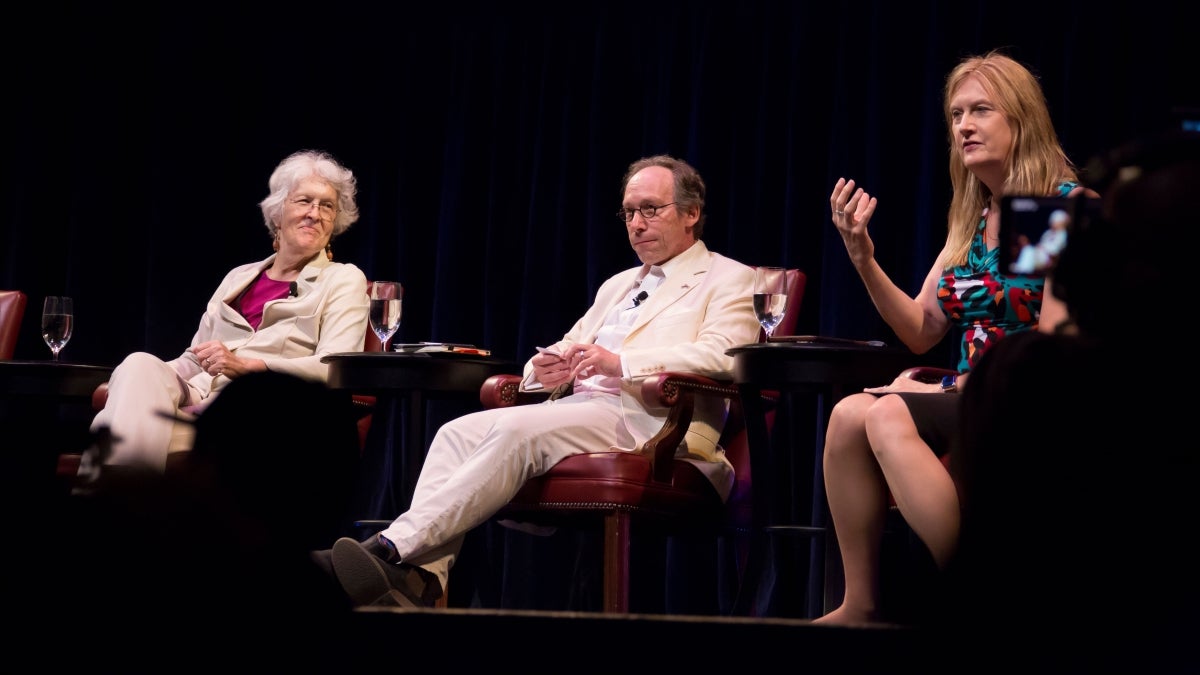Origins Project talks of sex, gender and reproductive rights

The Origins Project Great Debate in downtown Phoenix featured a panel that included (from left) Phyllis Randolph Frye, the first openly transgender judge in the U.S. who is known as the grandmother of the national transgender legal and political movement; moderator and ASU professor Lawrence Krauss; and Jennifer Finney Boylan, professor, author and LGBT advocate who wrote the first bestselling work by a transgender American. Photo by Tessa Menken
During last week’s Origins Project Great Debate, a stellar group of panelists explored a range of issues in the context of the scientific origins of sex and gender and the potential mismatch between the social, cultural and political ways we express and regulate them.
The panel included personal reflections of the transgender guests, bestselling writer Jennifer Finney Boylan and lawyer Phyllis Randolph Frye, whose perspectives were helpful in describing the challenges when going through a personal and public transformation, and how the world has ultimately responded to their journey.
“If you want to be helpful, you've got to live a life that lets people know that you are accepting. … And so all of you out there, if you are straight and loving and accepting, you've got to come out of the closet and let people know that,” said Frye, known as the grandmother of the national transgender legal and political movement, and the first openly transgender judge in the U.S.
Anne Fausto Sterling, the Nancy Duke Lewis Professor of Biology and Gender Studies at Brown University, discussed the science of sex and gender. Sterling’s research was presented to help attendees understand the application of dynamic systems theory to the study of sex and gender, how many variations of gender there are, and how people develop from infancy to adulthood.
“I'm going to make two major interrelated points. The first is that nature versus nurture is a false dichotomy. It's not the right way of looking at the world … it’s an ongoing process. We need to think about gender identity as developing dynamically and critically in the first two to three years of life,” Sterling said.
Arizona State University associate professor of law Kaiponanea Matsumura shared aspects of how the law considers gender and personal agreements and contracts, including same-sex marriage, and what rights are afforded to whom.
“The institution of marriage has modernized in many respects over the course of the 20th century. Nonetheless, remembering the historical context helps us to understand the various arguments that limiting marriage to opposite-sex couples is a form of sex discrimination,” Matsumura said.
Gloria Feldt, co-founder and president of Take the Lead and former CEO and president of Planned Parenthood Federation of America, joined the group of panelists to address reproductive rights, which she approached by focusing on the importance of women’s full legal, social and moral equality.
“We can change the story about what it means to be male and female and whatever gender we may see ourselves. I think there's a new vision taking shape now, and you all can be its champions. Making gender roles more fluid advances justice for everybody, if we hang together,” said Feldt.
Moderator Lawrence M. Krauss, director of the Origins Project at ASU, emphasized the connection between experts and their points of view and brought out perspectives that inspired attendees to question their own views about these important and sensitive topics.
“There's nothing worse than a disconnect between empirical reality and public policy, and if you look at all of our (Origins Project) events in one way or another, the idea is to bridge that disconnect. And there are very few places today where there's a greater disconnect than the reality of gender and sexuality and the public perception of that and public policy and legal policies that implement that,” Krauss said.
North Carolina’s recent “Bathroom Bill” was one of the many issues addressed, as were the implications of the recent Supreme Court decision regarding same-sex marriage.
As the evening drew to a close, Boylan offered: “And if you are afraid, you are not wrong to be afraid, but be wise about the risks and dangers there are in this world, but don't shut yourself off from the possible that you may well receive love where you least expect it.”
Boylan is a professor, author and LGBT advocate who wrote the first bestselling work by a transgender American and has consulted on both the Amazon series “Transparent: and the docs-series “I AM CAIT.”
The Origins Project also held a panel at the ASU Sandra Day O’Connor College of Law earlier that day that included a group of lawyers and ASU faculty, where these issues and topics were further explored through the legal aspects. Panelists included Zachary Kramer, James Weinstein, Frye and moderator Krauss.
To learn more about the Origins Project at ASU, please visit https://origins.asu.edu.
Written by Amelia Huggins
More Law, journalism and politics

Annual John P. Frank Memorial Lecture enters its 26th year
Dahlia Lithwick, an MSNBC analyst and senior legal correspondent at Slate, is the featured speaker at the School of…

The politics behind picking a romantic partner
A new study reveals the role that politics play when picking out a romantic partner — particularly for older adults.“Findings…

Tips to make tax season less taxing
When it comes to highly unpleasant experiences, filing taxes is probably up there with root canals — which is why people put off…